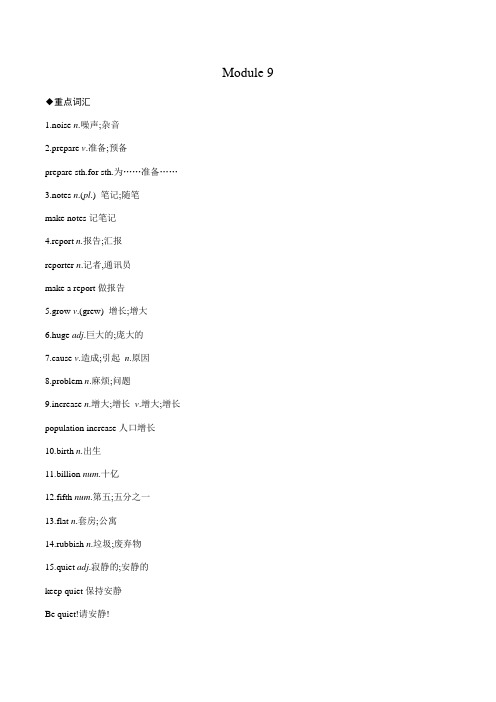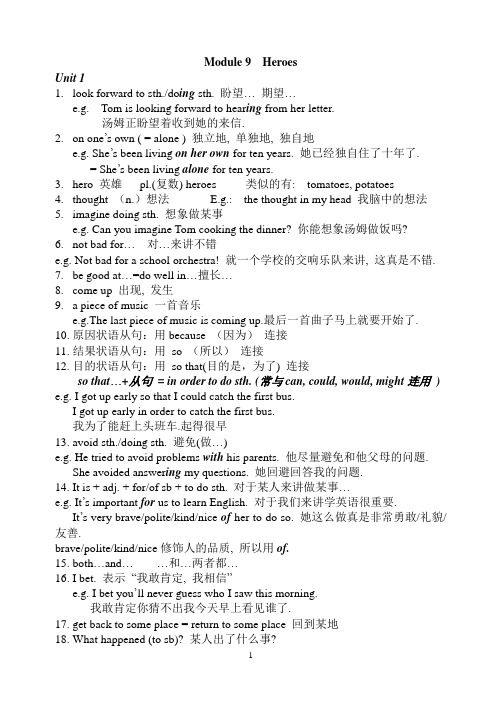外研版八年级上册Module 9知识点整理
- 格式:docx
- 大小:14.30 KB
- 文档页数:5

——————————新学期新成绩新目标新方向——————————Module9 PopulationUnit1 The population of China is about 1.37 billion.(读作one point three seven billion或one point thirty-seven)1. China has a population of about 1.37 billion. =China has about 1.37 billion people.=There are around 1.37 billion people in China. (注意population与people不连用)划线提问What’s the population of China?=How many people does China have?=How many people are there in China?a large/big/small population翻译:重庆的人口比北京多。
Chongqing has a larger/bigger population than Beijing.The population of Chongqing is larger/bigger than that of Beijing.Half of the population in the town are farmers.2. prepare (sth.) for…= get (sth.) ready for…note n. 笔记;便笺;钞票;音符;声调,语气vt. 注意;记录;对…加注释;指出take/write/make note s做笔记3. a report called the growing/increasing population 过去分词短语做定语grow-grew-grown v.增长(大);生长;种植;长高,变老4. We’re in the right place to talk about…正是谈论…的恰当时机。

外研版八年级上册M九知识点外研版八年级上册M九知识点是学生在八年级上学期学习的重点内容之一。
本文将从语法、词汇、阅读、写作四个方面进行讨论,帮助学生更好地掌握这些知识点。
一、语法:短语动词是英语学习中一个较为难点的语法知识点。
短语动词的组合往往由一个动词和一个或多个副词或介词组成。
学生需要熟记常用的短语动词,如"look after"意为"照顾","take off"意为"脱下"等。
此外,学生还要学会正确地使用短语动词,特别是在写作中避免使用过多的单个动词。
二、词汇:词汇是语言学习的基础,掌握好词汇对于学习英语非常重要。
八年级上册M九中包含了一些重要的词汇,如形容词的比较级和最高级形式,学生需要熟悉这些形式的构成规则。
此外,学生还要学会使用一些表示时间、地点、原因等的常用词汇,以丰富自己的表达。
三、阅读:阅读理解是学生的重要能力之一,但也是学生比较薄弱的环节之一。
在八年级上册M九中,包括了一些较长篇的阅读材料,学生需要提升自己的阅读能力。
在阅读过程中,学生要注意理解文中的主旨和细节,同时培养分析和推理的能力,使自己能够根据上下文推断词义或理解句子之间的逻辑关系。
四、写作:写作是语言学习的高级能力之一,也是学生在学习英语中需要不断提升的能力。
在八年级上册M九中,学生将接触到一些日常生活话题的写作题目,如写一篇关于自己家乡的短文等。
在写作过程中,学生需要注意使用正确的语法和词汇,合理组织文章结构,并通过丰富的细节和恰当的描述,使作文更加生动、有条理。
总结起来,学生在学习外研版八年级上册M九知识点的过程中,要注重语法的学习,熟悉常用的短语动词,掌握形容词的比较级和最高级形式。
同时,要多读多练,提高阅读理解能力和写作水平。
通过不断地学习和实践,相信同学们一定能够顺利掌握这些知识点,提高自己的英语水平。

Module 9◆重点词汇1.noise n.噪声;杂音2.prepare v.准备;预备prepare sth.for sth.为……准备……3.notes n.(pl.) 笔记;随笔make notes记笔记4.report n.报告;汇报reporter n.记者,通讯员make a report做报告5.grow v.(grew) 增长;增大6.huge adj.巨大的;庞大的7.cause v.造成;引起n.原因8.problem n.麻烦;问题9.increase n.增大;增长v.增大;增长population increase人口增长10.birth n.出生11.billion num.十亿12.fifth num.第五;五分之一13.flat n.套房;公寓14.rubbish n.垃圾;废弃物15.quiet adj.寂静的;安静的keep quiet保持安静Be quiet!请安静!16.local adj.当地的;本地的17.pupil n.学生;(尤指)小学生18.pollution n.污染environmental pollution环境污染air pollution 空气污染water pollution水污染noise pollution 噪音污染pollute v.污染19.public adj.公共的;公众的public services公共服务in public 公开的;当众20.service n.公共服务;服务21.solve v.解决问题22.hang on [口] 稍等23.close down (永久)关闭,关停24.in fact实际上◆重点句型1.I’m preparing some notes for a report called “Our growing population”.我正在为一份名为《我们日益增长的人口》的报告准备一些笔记。

Module9 PopulationUnit1 The population of China is about 1.37 billion.(读作one point three seven billion或one point thirty-seven)1. China has a population of about 1.37 billion. =China has about 1.37 billion people.=There are around 1.37 billion people in China. (注意population与people不连用)划线提问What’s the population of China?=How many people does China have?=How many people are there in China?a large/big/small population翻译:重庆的人口比北京多。
Chongqing has a larger/bigger population than Beijing.The population of Chongqing is larger/bigger than that of Beijing.Half of the population in the town are farmers.2. prepare (sth.) for…= get (sth.) ready for…note n. 笔记;便笺;钞票;音符;声调,语气vt. 注意;记录;对…加注释;指出take/write/make note s做笔记3. a report called the growing/increasing population 过去分词短语做定语grow-grew-grown v.增长(大);生长;种植;长高,变老4. We’re in the right place to talk about…正是谈论…的恰当时机。

Module 9 HeroesUnit 11.look forward to sth./do ing sth. 盼望…期望…e.g. Tom is looking forward to hear ing from her letter.汤姆正盼望着收到她的来信.2.on one’s own ( = alone ) 独立地, 单独地, 独自地e.g. She’s been living on her own for ten years. 她已经独自住了十年了.= She’s been living alone for ten years.3.hero 英雄pl.(复数) heroes 类似的有: tomatoes, potatoes4.thought (n.)想法 E.g.: the thought in my head 我脑中的想法5.imagine doing sth. 想象做某事e.g. Can you imagine Tom cooking the dinner? 你能想象汤姆做饭吗?6.not bad for…对…来讲不错e.g. Not bad for a school orchestra! 就一个学校的交响乐队来讲, 这真是不错.7.be good at…=do well in…擅长…e up 出现, 发生9. a piece of music 一首音乐e.g.The last piece of music is coming up.最后一首曲子马上就要开始了.10.原因状语从句:用because (因为)连接11.结果状语从句:用so (所以)连接12.目的状语从句:用so that(目的是,为了) 连接so that…+从句= in order to do sth. (常与can, could, would, might连用) e.g. I got up early so that I could catch the first bus.I got up early in order to catch the first bus.我为了能赶上头班车.起得很早13.avoid sth./doing sth. 避免(做…)e.g. He tried to avoid problems with his parents. 他尽量避免和他父母的问题.She avoided answer ing my questions. 她回避回答我的问题.14.It is + adj. + for/of sb + to do sth. 对于某人来讲做某事…e.g. It’s important for us to learn English. 对于我们来讲学英语很重要.It’s very brave/polite/kind/nice of her to do so. 她这么做真是非常勇敢/礼貌/友善.brave/polite/kind/nice修饰人的品质, 所以用of.15.both…and……和…两者都…16.I bet. 表示“我敢肯定, 我相信”e.g. I bet you’ll never guess who I saw this morning.我敢肯定你猜不出我今天早上看见谁了.17.get back to some place = return to some place 回到某地18.What happened (to sb)? 某人出了什么事?19.How do you feel about…你觉得怎么样20.What do you think of…你认为…怎么样?(Unit 221.one of China’s most famous heroes 中国最著名的英雄之一one of +形容词最高级+名词复数22.give one’s life to sth/doing sth. 献身于…e.g. He gave his life to saving the little boy.他为救那小男孩献出了自己的生命。

(外研版)初中英语八年级上册知识点归纳总结Module 1一、重点短语1. look up 查;查找2. make a mistake 犯错误3. talk about 谈论;讨论4. speak English 讲英语5. write down 写下;记下6. next to 在……旁边;紧挨着7. listen to the radio 听广播8. be good for 对……有好处9. write to 给……写信10. a little 有点11. agree with sb. 同意某人12. talk to 跟……交谈13. send sth. to sb. 把某物(发)送给某人14. ask for 请求15. watch films 看电影16. be from 来自17. smile at 冲……微笑18. go to bed 去睡觉19. get up 起床20. think about 考虑21. make friends with sb. 与某人交朋友22. take sb. around sp. 带领某人参观某地23. a few 几个;一些24. invite sb. to 邀请某人到……25. be good at 擅长26. for example 例如二、重点句型1. advise sb to do sth 建议某人做某事2. be afraid to... 害怕做……3. be good for... 对……有好处的4. be (a) great way(s) to do sth 做……的(一种)好方法5. It is natural to do sth. 做某事是合乎常情的。
三、重点语法1. Why not...? = Why don’t + you (we / they...)...?意为“为什么不……呢?”,后接动词原形。
eg:Why not / Why don’t we help the old cleantheir rooms this afternoon?今天下午为什么不去帮助老人打扫房间呢?2. What / How about...? 意为“……怎么样?”,其中about 是介词,后接名词或动词-ing 形式。
英语八年级上册外研版M9知识点英语八年级上册外研版M9知识点的掌握对于英语学习来说是非常重要的,因为它是英语学习的一个重要基础,也是英语学习的关键。
今天我们就来详细了解一下英语八年级上册外研版M9知识点。
一、课文理解
课文理解是英语学习的重要一环,尤其是在英语八年级上册外研版M9的学习中更是不可忽视的。
对于课文的理解需要我们掌握一定的英语知识点,包括单词、语法、听力、口语等等。
我们需要通过阅读和理解课文,积累实际应用的英语知识,提高英语应用水平。
二、语法知识
语法是英语学习的重要一环,它是语言的基础。
英语八年级上册外研版M9的语法知识点包括了主语、谓语、宾语、定语、状语、从句等等。
我们需要通过学习这些语法知识点来构建英语句子,并保证句子的正确性和流畅性。
三、单词记忆
单词是英语学习的基础,英语八年级上册外研版M9的词汇量较大,包括了很多生词和短语。
我们需要通过各种方式来记忆这些单词,例如词根词缀法、联想法、语境法等等。
同时,我们也需要掌握这些单词的正确用法和发音。
四、听力口语
听力口语是英语学习的重要一环,也是我们在英语八年级上册外研版M9学习中需要重点掌握的知识点。
通过听力练习和口语练习,我们可以提高对英语的理解能力和语音表达能力。
我们需要通过反复练习来掌握这些知识点,提高听力和口语水平。
总之,英语八年级上册外研版M9知识点的掌握对英语学习来说非常重要。
我们需要通过多种方式来学习和练习这些知识点,例如阅读、练习、听力、口语等等。
只有不断地学习、练习和积累,才能在英语学习的道路上越走越宽广。
Module 9. Population一、主题:人口(Population)二、必背单词名词:noise噪声;杂声notes笔记;随笔report报告;汇报problem麻烦;问题birth出生flat套房;公寓rubbish垃圾;废弃物pupil学生;(尤指)小学生pollution污染service 公共服务;服务动词:prepare准备;预备grow增长;增大cause造成;引起solve解决问题形容词:huge巨大的;庞大的quiet寂静的;安静的local当地的;本地的public公共的;公众的数词:billion十亿fifth第五;五分之一兼类词:increase n.增大;增长v.增大;增长三、常用短语1、prepare……for…… 为……准备……2、in the right place 在合适的地方3、in the world 在世界上4、one fifth of…… 五分之一……5、the world’s population 世界人口6、that is 也就是说7、hang on (口语)稍等8、write…down 写下……;记下……9、in the future 在将来10、at the start/end of… 在……的开始/结束11、a short/long time 短/长时间12、a piece of…… 一篇……13、close to 靠近14、move to 搬到15、in the city centre 在市中心16、close down (永久)关闭,关停17、a lot of traffic 许多车辆18、public services 公共服务19、help (to)do sth. 帮助做某事20、all over the world 全世界21、another huge problem 另一个大问题22、not……any more 不再……四、重点句型1、谈论人口的句型:(1)What is the population of Beijing ?(2)The population of China is about 1.37 billion.(3)Parkville was near Arnwick ,a city with 200,000 people.2、表示惊讶的句型:I c an’t believe it !3、表示请求问候的句型:Hang on a minute !五、模块语法1、冠词(不定冠词a/an、定冠词the和零冠词)2、数字(nine hundred and seventy-eight、two hundred and three)Module 9.Population详细笔记1. I’m preparing some notes for a report called "Our growing population.”我正在为一篇题为“我们日益增长的人口"的报告准备一些笔记。
外研版八年级上册Module 9知识点整理
一.重点短语
1.talk about谈论
2.such as例如
3.population increase人口增长
4.prepare notes 准备笔记
5.the population of China中国的人口
6.one fifth五分之一
7.I can't believe it!我简直无法相信!7. billion七十亿
9.hang on稍等10. more than超过
11. close to靠近12. not...any more不再
13. local school当地的学校14. close down(永久)关闭,关停15.in fact事实上16. all over the world全世界17. too much rubbish太多的垃圾18. for example例如
19.in the future在将来
二.用法集萃
1.形容人口(population)的多少用big/large或small.
2.too much+不可数名词太多……
3.over相当于more than,意为“超过”
4.even+比较级更加……
5.have to+动词原形不得不做某事
6.need to do sth. 需要做某事
7.What’s the population of…?......的人口是多少?
8.It takes sb. some time to do sth.某人花费多长时间做某事.
三.重点句型
1. The population of China is about l.37 billion.
中国的人口大约是13.7亿。
2. That's almost one fifth of the world's population...
那几乎是世界上五分之一的人口……
3. It takes an hour to get there by bus.
乘公共汽车到达那儿要花一个小时的时间。
四.语法归纳(一)冠词(二)数词
(一)冠词
教材中的例句
1.What is the population of Beijing?北京的人口是多少?
2.It was a quiet village.它是一个安静的村庄.
3.It takes an hour to get there by bus.乘公共汽车到达那儿要花一个小时的时间.
语法归纳
(一)冠词是限定词的一种,不能单独使用,常用于修饰名词。
冠词有三种形式:不定冠词a/an,定冠词the和零冠词(即不使用冠词).在英语中,冠词的用法如下:
1.不定冠词的用法
不定冠词的用来修饰可数名词单数,指人或物中的某一个或某一类,但不具体说明是何人何物。
①表示“一个”的概念。
Population is a big problem for cities.
②表示“每一”的概念,相当于every. I watch TV once a week.
③首次提到某人或某物,不定冠词起介绍作用.A student wants to ask you some questions.
④某些固定短语中,要用不定冠词.have a good time have a rest 2.定冠词的用法
①指前文提到过的人或物.I have a dog. The dog is black.我有一只狗。
这只狗是黑色的。
②特指某人或某物。
The girl with long hair is my younger sister.这个留长发的女孩是我的妹妹。
③指说话双方都知道的人或物。
I had to write the same report last term.上学期我不得不写了同样的报告。
④用于专有名词前。
the Great Wall长城the Pacific Ocean太平洋
⑤用于世界上独一无二的事物前。
the sun太阳the moon月亮
⑥用于姓氏复数形式之前,表示“一家人”或“夫妇二人”。
the Smiths史密斯一家/史密斯夫妇
⑦用于形容词最高级前。
the biggest city最大的城市
⑧用于序数词前。
the first boy第一个男孩
⑨用于西洋乐器名词前。
play the piano弹钢琴
⑩某些形容词前加定冠词the,表示一类人或物。
he young年轻人the old老人
此外,定冠词还可用于某些固定短语中。
in the morning在早上he day after tomorrow后天
3.零冠词的用法
①在球类活动、学科名称前以及节日、月份、星期前不用冠词。
Tom can play volleyball.汤姆会打排球。
②名词前已有指示代词、物主代词、不定代词或数词等作定语时,名词前不用冠词。
There are many books in her schoolbag.她的书包里有许多书。
③在某些固定短语或习惯用语中不用冠词。
by bus乘公共汽车have breakfast吃早饭at home在家
(二)数词
教材中的例句:
1. The population of China is about l.37 billion. 中国的人口大约是13.7亿。
2. That's almost one fifth of the world's population...
那几乎是世界上五分之一的人口……
语法归纳
数词分为基数词和序数词。
在英语中,每三位数为一个单位,按照百、十、个位向下读。
而进位的读法则为thousand,million,billion向上递增。
129读作:one hundred and twenty-nine
1, 129读作:one thousand one hundred and twenty-nine
l,129,129读炸:one million one hundred and twenty-nine thousand one hundred and twenty-nine
【拓展】数词的常见用法:
①分数的表达
在英语中,分子用基数词,分母用序数词。
当分子是1时,分母用原形;当分子大于1时,
分母用复数形式。
如:1/3 one third; 2/3 two thirds。
②百分数的表达
百分数用percent表示,符号为%。
如:5%读作five percent。